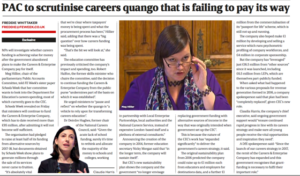PUBLIC ACCOUNTS COMMITTEE TO INVESTIGATE THE DEPARTMENT FOR EDUCATION’S CAREERS WORK SPENDING
HOT OFF THE PRESS!
FE News 3rd May 2019
PAC to scrutinise careers quango that is failing to pay its way
“MPs will investigate whether careers funding is achieving value for money after the government abandoned plans to make the Careers & Enterprise Company pay for itself.
Meg Hillier, chair of the parliamentary Public Accounts Committee, told FE Week’s sister paper Schools Week that her committee wants to look into the Department for Education’s careers spending, most of which currently goes to the CEC.
Schools Week revealed on Friday that ministers will continue to fund the Careers & Enterprise Company, which has to date received more than £95 million, after admitting it will not become self-sufficient.
The organisation had pledged to raise at least half of its funding from alternative sources by 2017-18, but documents obtained by Schools Week show plans to generate millions through the sale of its services never came to fruition.
“It’s absolutely vital that we’re clear where taxpayers’ money is being spent and what the procurement process has been,”Hillier said, adding that there was a “big question” over how careers funding was being spent. “That’s the bit we will look at,” she said.
The education committee has previously criticised the company’s impact and spending, too.
Robert Halfon, the former skills minister who chairs the committee, said the decision to continue funding the Careers & Enterprise Company from the public purse “undermines part of the basis on which it was established”.
He urged ministers to “pause and reflect” on whether the quango is “a vehicle to rely upon for transforming careers education”.
Dr Deirdre Hughes, former chair of the National Careers Council, said: “Given the acute lack of school funding, surely it’s time to rethink and allocate the majority of the money to schools and colleges, working in partnership with Local Enterprise Partnerships, local authorities and the National Careers Service, instead of expensive London-based staff and a plethora of external consultants.”
Announcing the creation of the company in 2014, former education secretary Nicky Morgan said that “in the longer term, the company will sustain itself”.
But CEC’s new sustainability plan shows the company and the government “no longer envisage replacing government funding with alternative sources of income in the way that was originally intended when government set up the CEC”.
This is because the nature of the CEC’s work has “expanded significantly” to deliver the government’s careers strategy, it said.
The original sustainability plan from 2016 predicted the company could raise up to £1 million each from educators and employers for destinations data, and a further £1 million from the commercialisation of its “passport for life” scheme, which is still not up and running.
The company also hoped make £1 million by developing and selling a service which runs psychometric profiling of company workforces, and £4 million in corporate sponsorship.
But the company has “leveraged” just £16.5 million from “other sources” since it was launched, including £6.5 million from LEPs, which are themselves part publicly funded.
When asked what had happened to the various proposals for revenue generation formed in 2016, a company spokesperson said that plan had been “completely replaced”, given CEC’s new role.
Claudia Harris, the company’s chief executive, said ongoing government support would “ensure continued rapid progress in line with its careers strategy and make sure all young people receive the vital opportunities and inspiration they need”.
A DfE spokesperson said: “Since the launch of our careers strategy in 2017, the remit of the Careers & Enterprise Company has expanded and this government recognises that grant- funding is necessary to fulfil their important role.”


